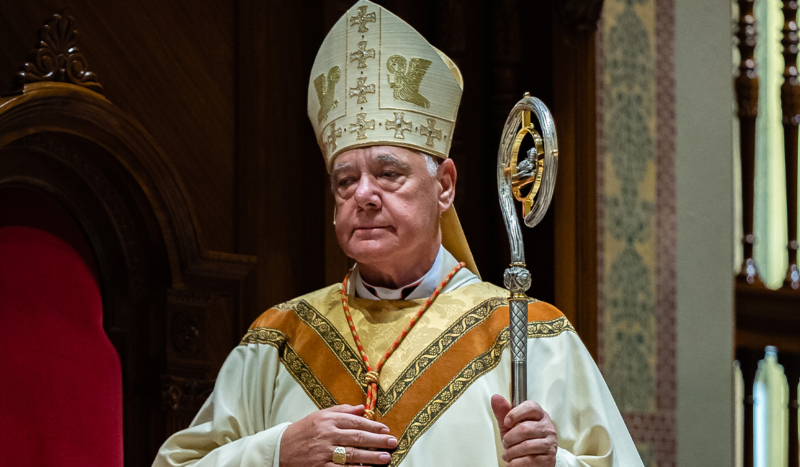
Alison Girone
CV NEWS FEED // Cardinal Gerhard Müller, the former prefect of the Congregation for the Doctrine of the Faith, has warned that factions within the Church are exploiting synodality to advance ideologies fundamentally opposed to Catholic doctrine, which he has condemned as “sins against the Holy Spirit.”
In a Nov. 22 article published in First Things titled “The Seven Sins Against the Holy Spirit: A Synodal Tragedy,” the Cardinal offered a sharp rebuke of the ongoing synodal process being pushed in the Church.
Cardinal Müller argued that the synodal process, traditionally intended to foster collaboration between bishops and lay faithful, had been “hijacked” to promote a progressive agenda. He accused these factions of attempting a “180-degree turn” in the Church’s doctrine, liturgy, and morality to align with what he called “neo-gnostic woke ideology.”
Drawing a parallel to the ancient Gnostics, Müller quoted Irenaeus of Lyon, who condemned Gnostic tactics for “falsify[ing] the oracles of God” and using “specious and plausible words” to confuse and mislead the faithful. Müller asserted that the modern-day reinterpretation of Catholic teaching, under the guise of direct inspiration from the Holy Spirit, threatened to dismantle the Church’s foundations.
Cardinal Müller began his critique by addressing the first of what he called the “sins against the Holy Spirit”: a failure to recognize the Holy Spirit as a divine person. He argued that certain synodal advocates equated the Holy Spirit with concepts like the “Weltgeist” of Hegel or the “volonté générale” of Rousseau, stripping the Spirit of its Trinitarian identity.
“It is a sin against the Holy Spirit,” he wrote, “if one does not confess him as the divine person who, in unity with the Father and the Son, is the one God.”
He also criticized what he described as the reinterpretation of Christian dogma as an “evolution of revelation.” Cardinal Müller warned against reducing the Church’s teachings to the outcomes of cultural progress or ideological movements. Quoting Irenaeus, he reaffirmed that Catholic hermeneutics rest on three unchanging principles: “Holy Scripture; apostolic tradition; and the teaching authority of the bishops by virtue of apostolic succession.”
He further emphasized that no scientific or cultural development could override the revealed truths of faith.
“The pope can thus neither fulfill nor disappoint the hopes for change in the revealed doctrines of faith,” he said, “because ‘this teaching office is not above the word of God, but serves it, teaching only what has been handed on’” (Dei Verbum, 10).
The Cardinal also addressed the risks of undermining the unity of the Church through decentralization. He criticized the idea that regional bishops’ conferences could interpret doctrine differently, arguing that it would fracture the Church’s universal mission. Quoting Irenaeus once again, Cardinal Müller reminded readers that “the Catholic Church possesses one and the same faith throughout the whole world.” He warned against reducing the Church to a political battleground for power, emphasizing that its unity is grounded in Christ and the sacraments.
Cardinal Müller strongly condemned arbitrary actions against bishops, including dismissals without canonical processes and appointments without careful examination. He insisted that bishops are appointed through the sacrament of Holy Orders and that appointments should not be subject to personal or ideological whims. Disciplinary measures, he argued, must be based on clear criteria, such as heresy or moral misconduct, rather than political convenience.
The Cardinal expressed particular concern over the “instrumentalization” of the Church for secular purposes, warning that it reduced Christianity to a tool for political agendas like “eco-socialist climate neutrality” or “Agenda 2030.” He rejected efforts to subordinate the Church’s supernatural mission to worldly goals.
“The most current sin against the Holy Spirit is when the supernatural origin and character of Christianity is denied in order to subordinate the Church of the Triune God to the goals and purposes of a worldly salvation project,” he wrote.
Cardinal Müller also took aim at recent developments within the synodal process itself. He took issue with Pope Francis’ statement that allowed for regional interpretations of doctrine, arguing that it introduced relativism into the Church’s teachings.
The Cardinal closed his most recent critique by urging Catholics to remain steadfast in their faith, grounded in the teachings of Christ and the guidance of the Holy Spirit. He reminded readers of Christ’s promise: “The Advocate, the Holy Spirit, whom the Father will send in my name, will teach you everything, and remind you of all that I have said to you” (John 14:26).
The path forward, he concluded, lies in unwavering fidelity to divine revelation and the Church’s authentic magisterium, resisting the temptation to conform to fleeting cultural trends.

